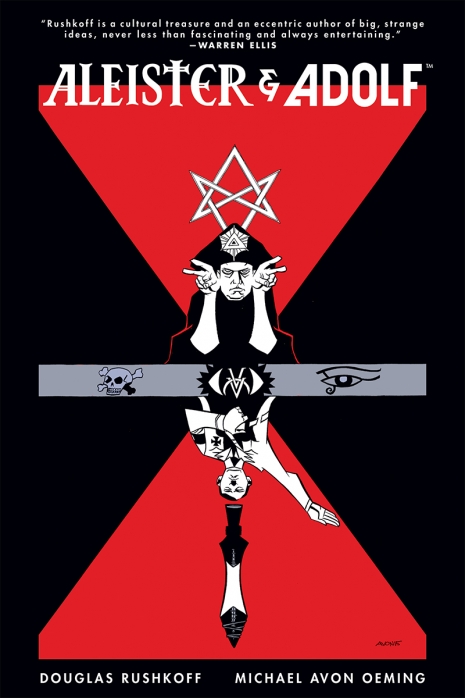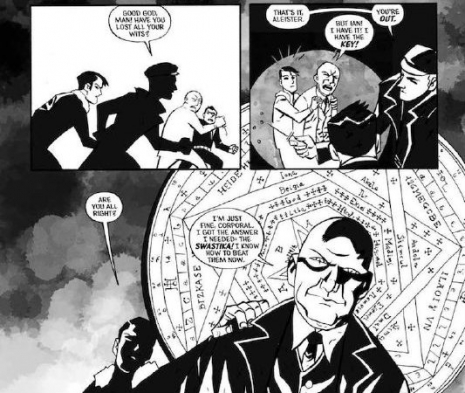
Aleister & Adolf is a new graphic novel from Dark Horse Comics, the product of the creative pairing of media theorist Douglas Rushkoff—Professor of Media Studies at Queens College in New York—and and award-winning illustrator Michael Avon Oeming.
In Aleister & Adolf the reader is taken behind the scenes of the capitalist spectacle and inside the boardrooms where corporate-occult marketing departments employ fascist sigil magick developed by the Nazis during WWII in today’s advertising logos. A place where the war for men’s minds is waged with symbols and catchy slogans. It’s a fun smart read and you’ll be much smarter after you’ve read it, trust me. And Oeming’s crisp B&W artwork is perfectly suited for getting across some often difficult and tricky philosophical concepts. He’s a unique talent indeed.
Rushkoff recently told AV Club:
“Swastikas and other sigil logos become the corporate logos of our world. And given that we’re living in a moment where those logos are migrating online where they can move on their own, it’s kind of important that we consider the origins and power of these icons.”
Grant Morrison even wrote the introduction to Aleister & Adolf. I mean, how can you lose with something like this?
I asked Douglas Rushkoff a few questions via email:
Dangerous Minds: Where did you find the inspiration for Aleister & Adolf?
Douglas Rushkoff: It’s almost easier to ask where didn’t I find inspiration for Aleister & Adolf. The moment it occurred to me was when I was in an editorial meeting at DC/Vertigo about my comic book Testament, back in 2005. The editor warned me that there was an arcane house rule against having Jesus Christ and a Superhero in the same panel. Not that I was going to get to Jesus in my story, but the rule got me thinking about other potentially blasphemous superhero/supervillain pairings. And that’s when I first got to wondering about Aleister Crowley vs. Adolf Hitler.
But as I considered the possibility, it occurred to me that they were practicing competing forms of magic at the same time. And then I began to do the research, and learned that the premise of my story was true: Aleister Crowley performed counter-sigils to Hitler’s. Crowley came up with the V for Victory sigil that Churchill used to flash—and got it to him through Ian Fleming (the James Bond author) who was MI5 at the time.
I’ve always wanted to do something about Crowley, but I’ve been afraid for a bunch of reasons. Making him something of a war hero, and contrasting him with a true villain like Hitler, became a way to depict him as something more dimensional than “the Beast.”
Did you think of the ending first? It’s a bit like a punchline, isn’t it?
Douglas Rushkoff: I didn’t think of the ending first. The first thing I thought of was to have a young American military photographer get sent to enlist Crowley in the magical effort. I wanted us to see the story through someone like us—someone more cynical, perhaps—and then get to have the vicarious thrill of being drawn into Crowley’s world.
Then, I decided I needed a framing story - just to show how relevant all this creation of sigils is to our world today. So I created a prologue for the story, that takes place in a modern advertising agency: the place where the equivalent of sigil magic is practiced today. I wanted to set the telling of the story within the frame of how corporate sigils are taking life on the Internet today. So the outer frame takes place in the mid-90’s, when the net was being turned over to marketers. The ending is pretty well broadcast up front.

Aleister & Adolph reminds me a lot of Robert Anton Wilson’s Masks of the Illuminatus—which I think is his best book—because it sort of forces its ideas into the reader’s head like an earworm that you can’t resist. Also Crowley is a character in that book, too, of course. Do you see it as a bit of a RAW homage?
Douglas Rushkoff: It’s a RAW homage in that the story has verisimilitude—it is told in a way where it’s absolutely possible for this all to happen. There’s no supernatural magic here; it’s just the magick of Will. There’s the black magic of the Nazis. But however extreme the Nazis, it was real. It’s got the reality quotient of Eyes Wide Shut or Apocalypse Now.
And that’s the understanding of sigil magic I got from Bob. It’s all very normal. That doesn’t mean it doesn’t work. Just that you have to participate in its perception. It’s just a different way of understanding the connections. So while the protagonist of the story starts off as a disillusioned atheist and ends up believing in magick as Magic, even Crowley (at least my Crowley) tries to convince him not to take it so literally.
I wouldn’t understand magick that way if it weren’t for Bob. It’s embedded in the fabric of reality. It doesn’t need to break the rules of reality to work.

Are you aware of a recent trend among some alt-right types to organize acts of group 4Chan “meme magick”? Some of it’s just blatant harassment and bullying over Twitter, but there’s actually a sophisticated intent behind some of it. Pepe the Frog has become a hypersigil. I’m not being admiring of it—the idea that certain reichwingers would want start a magical war via social media is alarming to say the least—but the concept is a sound one magically speaking: They’ve figured out how to amplify their signal’s strength like a radio transmitter.
Douglas Rushkoff: There’s a real crossover between the alt-right and the occult. I knew a guy writing a book about it, in fact. And remember, it was one of Bush’s advisors who once explained that the future is something you create. And there’s an any-means-necessary quality to libertarianism that is consonant with chaos magic.
Plus, you’re talking about homespun propagandists inhabiting the comments sections of blogs and things. They’re not reading Bernays and Lippman. They’re waging hand-to-hand battle in the ideological trenches. A bit of NLP, rhetoric, and magic are what you turn to.
The interesting thing here is why the left does not use these techniques. It goes against our sense of what is fair. We know we’re “right” and so we want to win with the fact. Sigil magic feels like cheating on some level. So we have to ask ourselves, isn’t the full expression of our Will something we want to unleash? If not, why not?
This isn’t the freethinking/pansexual “Generation Hex” types who seemed to be on the horizon a few years ago, but rather like an evil skinheads contingent at Hogwart’s.
Douglas Rushkoff: Alas it is not. That’s partly because the freethinking pansexuals got a bit distracted by other things. And most of them worked alone. I don’t think there were nearly as many, either. That’s pretty rarified air. Back in the 80’s, there were more kids taking acid in the parking lot at AC/DC concerts than there were in the dorms of Reid College. And likewise - as a result of economics as much as anything - there’s more gamergaters throwing sigils online than Bernie Sanders supporters. Sometimes magic gets in the hands of people you’d rather not find it.

Photo of Douglas Rushkoff by Jeff Newelt